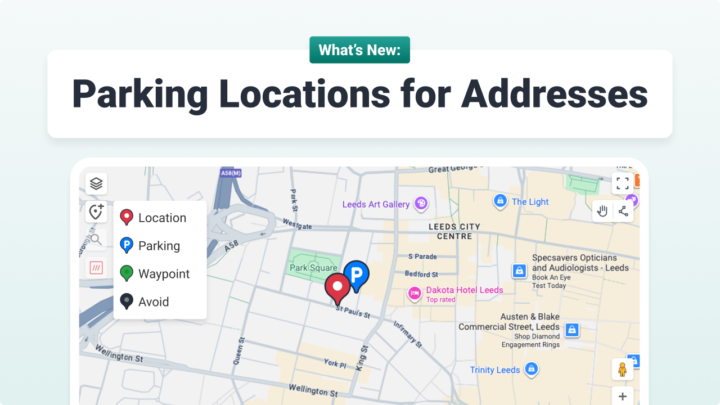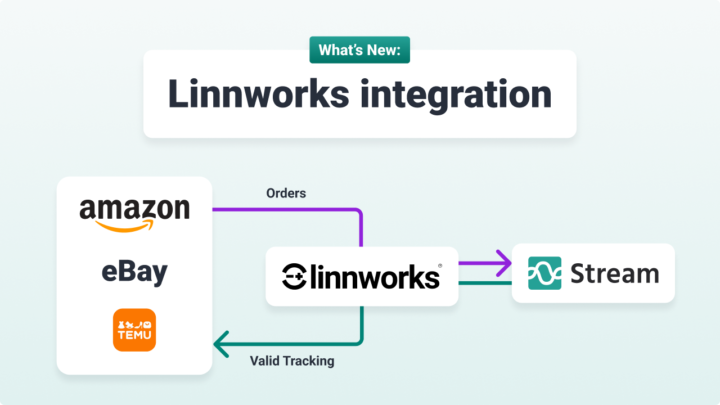It’s that time of the month again where we reflect on the previous month’s news headlines pertaining to the fast evolving world of alternative drivetrains.
April’s news featured Asda, Wayve, the ACEA, London’s Ambulance Service, ChargeUK and Tarmac, as we ended the first quarter of 2023 with some promising news regarding the future outlook of the industry.
Asda Partners With Wayve To Trial Self-driving Grocery Deliveries in London

Asda partners with Wayve press shot. Source: ASDA
Asda have announced that they have partnered with autonomous vehicle technology start-up Wayve to deliver groceries to customers using self-driving vehicles. The year-long trial, which Asda has dubbed the ‘UK’s largest self-driving grocery home delivery trial’, will test the suitability for the supermarket chain to autonomously deliver groceries to a catchment area of more than 170,000 residents across 72,000 households in London.
The Wayve self-driving vehicles will join Asda’s existing online delivery operation at the Park Royal superstore in West London, and have the capability to drive themselves to customers’ homes without human intervention.
The launch follows a two-year partnership between Asda and Wayve, as they work towards successfully implementing a driverless vehicle solution for the grocery market that improves efficiency and cuts cost.
Simon Gregg, vice president of e-commerce at Asda, stated: “Asda has long understood the value of bringing tech innovation to the online grocery sector and we are always looking at new and innovative partnerships to improve delivery options for customers. We believe autonomous technology is an exciting opportunity to shape the future of delivery, not only at our Park Royal store but throughout our nationwide operation.”
“Through our partnership with Wayve, we are trialling this technology to understand how it can assist our busy store operations, whilst also adding a unique, reliable and efficient option for Asda customers to have a whole range of products delivered to their doors.”
Wayve’s ‘AV2.0’ AI software solution will use machine learning throughout the trial to gather data on how the vehicles navigate in dense urban environments and solve wider challenges associated with self-driving technology.
Research on how effective driverless cars are for the environment is currently limited. However, early research suggests that they are more efficient than their human occupied counterparts, as they operate via accurate route optimisation and road occupancy technology, subsequently reducing fuel consumption and improving road safety.
Alternative Drivetrain Vehicle Registration Figures in the EU For March Revealed
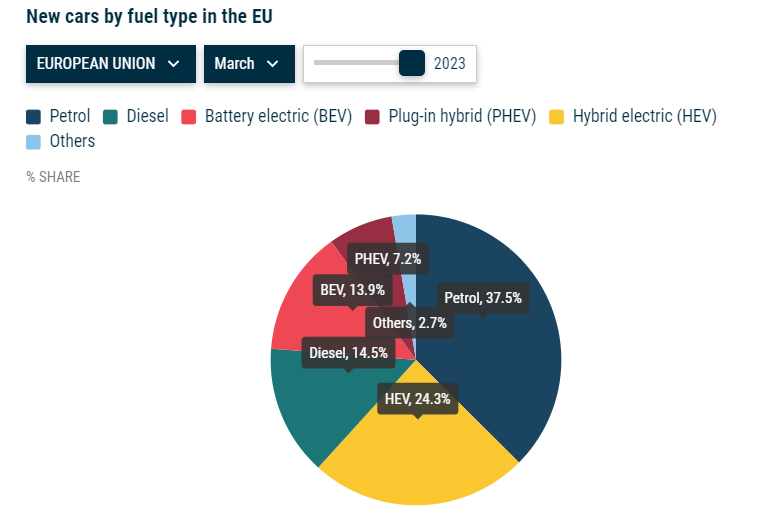
New cars registered by fuel type in the EU March 2023. Source: ACEA
The ACEA have published the EU’s new car registration figures for March and their subsequent market share by fuel type, highlighting the progress the bloc and member states are making towards decarbonising the transport sector.
In the first quarter of 2023, the EU car market saw a substantial increase in new car registrations, with almost 2.7 million units sold – a 17.9% increase when compared to the first quarter of 2022. Among the four major EU markets, Spain (+44.5%), Italy (+26.2%) France (+15.2%) and Germany (+6.5%) saw the biggest increase in new car registrations throughout the month.
March saw significant increases in the market share of hybrid cars to 24.3%, and battery electric cars increased their overall market share to 13.9%. Despite the shift to vehicles that are powered by alternative drivetrains, petrol-powered vehicles still boast the largest market share at 37.5%, but their dominance continues to wane.
Battery electric vehicles (BEVs) also proved to be exceptionally popular throughout the month, as registrations surged 57% to reach 151,573 units. Subsequently, the market share for BEVs has increased to 13.9%, an overall 2.5% increase in comparison to their market share noted by the ACEA in March 2022 (11.4%).
These gains attributed to the surge in BEV registrations were primarily driven by the Netherlands, the EU’s third-largest automobile market, which saw sales more than double during the month in comparison to February. As a result, the cumulative number of BEV units registered in the first quarter of 2023 in the EU rose by 43.2% to 320,987.
Hybrid electric vehicles (HEVs) had a positive month for registrations in March too, with sales increasing by 38.1% to 264,694 units. HEVs increased their overall market share to 24.3%, up by 1.6% from March 2022 (22.7%).
Overall a positive month for alternative drivetrain adoption in the EU, as well as the bloc’s wider progression towards their net zero targets within the transportation sector.
New Trade Body Charge Point Operators to Invest £6bn in UK’s EV Charging Infrastructure
A new trade body comprising eighteen of the UK’s largest charge point operators (CPOs) called ChargeUK have launched, and revealed investment plans up to 2030, with more than £6 billion expected to be invested in installing and operating new EV charging infrastructure across the island.
Tens of thousands of new chargers are anticipated to be installed by the end of 2023, as ChargeUK aims to double the size of the current charging network throughout the year. According to ZapMap, an independent site that tracks charging point installations across the UK, at the end of April 2023 there were 42,566 electric vehicle charging points located across 24,909 charging locations. This represents a 37% increase in the total number of charging devices since April 2022.
Ian Johnston, chair of ChargeUK and CEO of Osprey Charging Network, said: “The formation of ChargeUK is an exciting day and is a demonstration of the electric vehicle charging industry’s growing size and importance to the UK economy. Together we are investing billions of pounds to get more charge points in the ground right across the country. These numbers reinforce our commitment to the UK’s Net Zero future.”
ChargeUK has also pledged to work closely with the Government and other key stakeholders to accelerate the transition through policy and regulation, as the UK gears up to achieving net zero by 2050.
London Ambulance Service Accelerates Towards Net Zero Target with New Fleet of Electric Mustangs
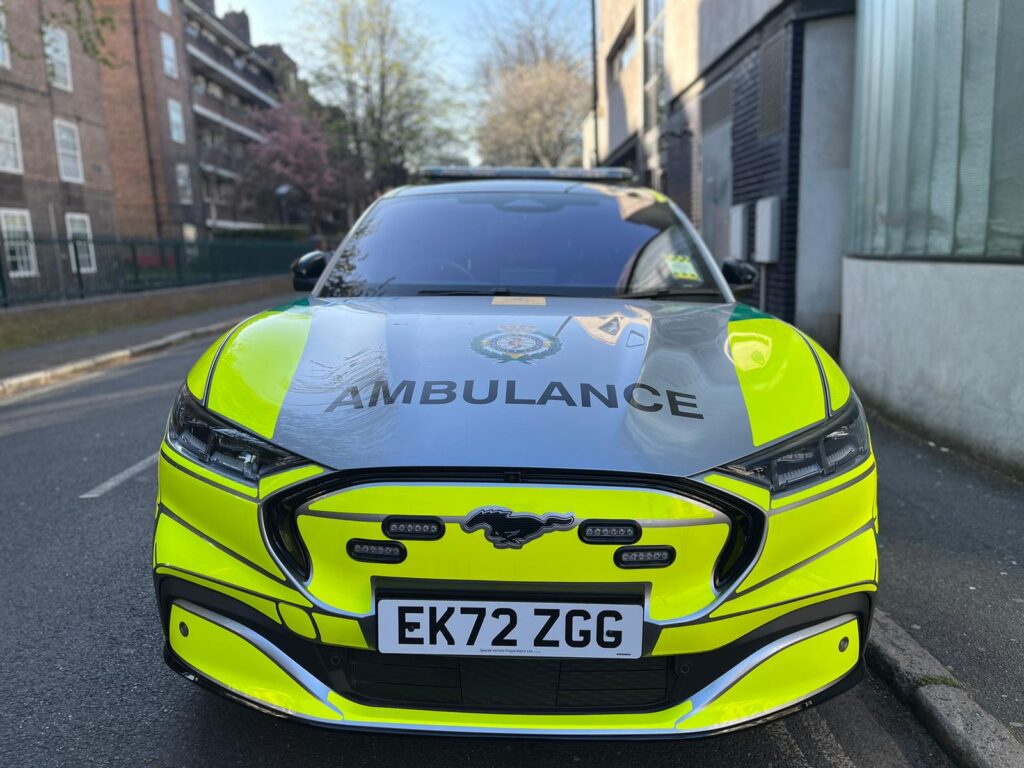
London Ambulance Service’s Mach-E Mustang. Source: LAS
As part of London Ambulance Service’s mission to decarbonise its fleet, the organisation have ordered 35 Mustang Mach-E vehicles to join the seven that they currently have in operation. The impending additions of the iconic cars will make it the largest fully electric fleet of Fast Response Units (FRUs) in the UK.
Daniel Elkeles, Chief Executive of London Ambulance Service (LAS), said: “I’m very proud that we have the biggest electric fleet of fast response cars in the country and we can contribute to reaching net zero. Having cleaner and greener vehicles is extremely important in improving air quality – not just for our people and our patients – but also for the health of our communities across London.”
The cars have been modified to suit paramedics responding to 999 emergencies in the capital – including a fast 40 minute charge time and a 300 mile driving distance per full charge, which is around ten times further than ambulances typically would cover on a shift. Additional solar panels are being added to each vehicle to further improve the sustainability and power efficiency of the vehicles.
The UK’s First All-electric Concrete Mixer Concludes Successful Trial
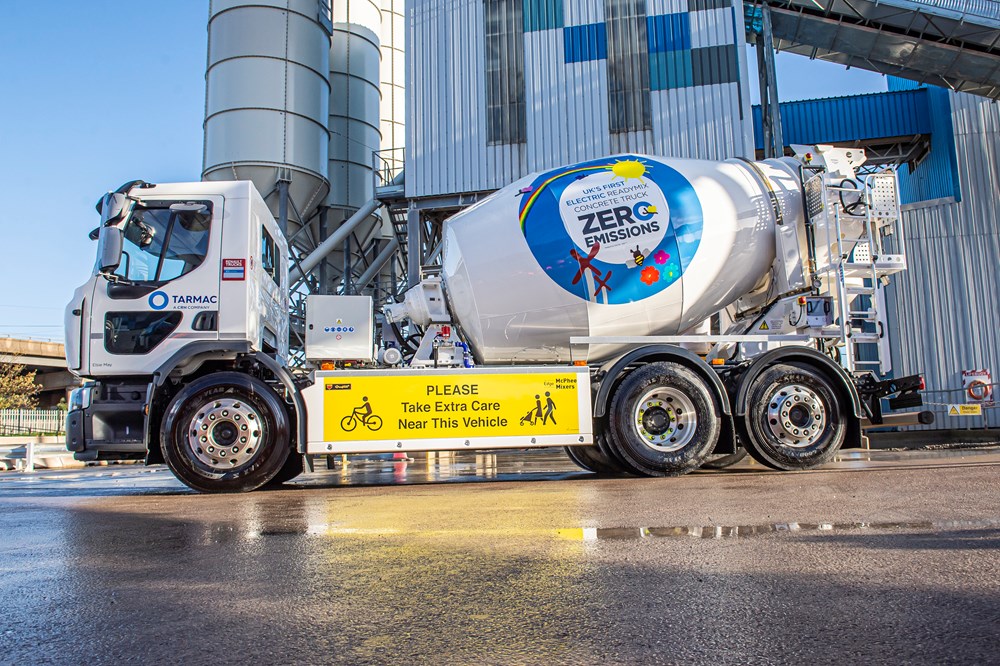
Tarmac’s e-mixer displayed at Washwood Heath. Source: Tarmac
Tarmac, the UK’s leading sustainable building materials and construction solutions provider, has successfully concluded a three-month trial testing the UK’s first all-electric concrete mixer for commercial deliveries across Birmingham.
Created in partnership with Renault Trucks and TVS Interfleet, the ‘e-mixer’ is the first all-electric concrete mixer of its kind, and it forms a key part of Tarmac’s decarbonation strategy for construction projects.
Tarmac expects the vehicle to save 42 tonnes of CO2 annually, with zero emissions per mile compared to 1.55 kg of CO2 per mile for its fossil fuel equivalent. Ben Garner, Tarmac’s low carbon logistics lead, reflected on the news: “We have committed to being at the forefront of implementing low CO2 transport and logistics solutions and the successful operation of this e-mixer is a significant milestone for both Tarmac and the UK construction sector.
“Our extensive logistics capabilities and strong collaborative relationships with supply chain partners enable us to continue exploring initiatives and innovations that move high quality construction materials to the right place at the right time, supporting our customers with the delivery of a lower carbon built environment. With the arrival of this new vehicle, we’re able to offer something completely new to the market and demonstrate that a fully integrated low carbon logistics model is possible.”
